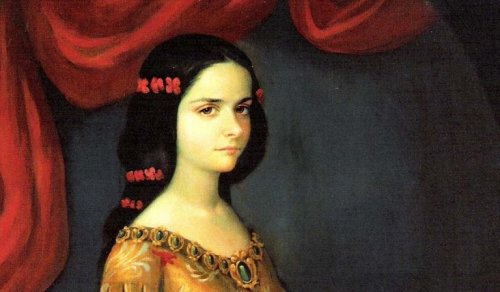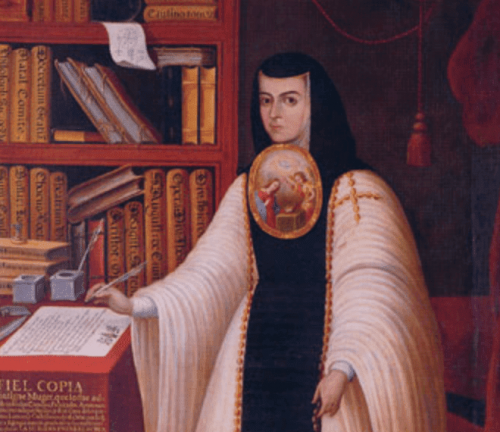Sor Juana Inés de la Cruz - A Rebel

Sor Juana Inés de la Cruz’s life is truly fascinating and surprising. Those who are familiar with her work will agree. Also, her story will be a pleasant surprise if you don’t know her.
Firstly, literature, like the rest of the arts and any other type of knowledge, was only available to men for a long time. But only to a selected few. It takes more than knowing how to write for a literary work to be significant, something that doesn’t fade over time. And if you add to it that, for centuries, illiteracy was the rule and women, in particular, had little to no access to education, then you realize that most of the literary production came from men.
However, there are always exceptions that, on numerous occasions, haven’t interested the critics, historians, educators, or any other institutions. So consequently, the current educational system continues to reward men.
A man’s world
Of course, there are many outstanding men in literature. Thus, people should read and study many great male authors. But you’ve most likely met few female authors throughout your academic life. In fact, many deserve the place they have in the history of literature. Sor Juana Inés wasn’t only a scholar, but her desire for knowledge led her to excel in innumerable skills. In addition, her life was anything but traditional. This is because she broke the barriers that her time imposed on her simply for being a woman. Thus, she truly rose as the intelligent woman she was.
The early life of Sor Juana Inés de la Cruz
Sor Juana Inés de la Cruz was born in 1651 in the town of San Miguel de Nepantla (New Spain, current Mexico). She was the daughter of a Spanish captain and labeled as a creole. Her mother, Isabel Ramírez, had six children from different relationships. In fact, she declared herself a single woman, something rather atypical at the time. Sor Juana’s mother chose not to get married.
Sor Juana’s interest in literature and studies appeared early on. At the age of right, she already composed Eucharistic praise and, a few years later, after discovering universities in Mexico, she decided to enroll. However, women couldn’t go to college in the mid-seventeenth century in New Spain. Thus, Sor Juana Inés had the brilliant idea of dressing up like a man in order to able to study.

In the end, she didn’t carry on with that idea and became a self-taught writer. Deeply attached to her grandfather, she began studying in his library. Some say Sor Juana Inés de la Cruz was a brilliant young woman of prodigious intelligence. She learned Latin in just 20 lessons and even got to take a wise person test. Also, Sor Juana was a rather self-demanding woman; some say she cut locks of her hair when she couldn’t learn a lesson.
A young Sor Juana
From a very young age, people began to ask her to compose verses. Thus, most of her poetic production was by commission. Sor Juana’s fame increased and the Marquises of Mancera learned about it, they eventually became her patrons. As a member of the court, she was part of an environment that favored her desire for knowledge. There, she could have books, study, and learn.
Sor Juana Inés de la Cruz and progress
During her time at the court, the young woman learned to play instruments and was interested in many different things. In addition, she had a wide theatrical production made up mainly of praise, comedy, and autos sacramentales. Finally, in 1667, Sor Juana Inés left the court for the convent and became a nun.
Don’t think of a convent as a place for confinement. In reality, what Sor Juana wanted was to be able to live alone and have a space to study. In the 17th century, joining a convent was the closest thing to that. Sor Juana had a space reserved for her library and was able to keep the gifts that powerful people sent her. In turn, she could have instruments and enjoyed a certain hierarchy within the convent. Sor Juana kept accounts and had maids so she could spend all of her time studying.
In addition, life at the convent wasn’t as quiet as one might expect. She received criticism from the other nuns because she was different and, on one occasion, they even forbade her to study. You must know that Sor Juana wasn’t your typical nun. On the contrary, she wrote intently and got in trouble for it. However, she defended her personal freedom and, ultimately, the freedom of all women. She claimed they all could also gain access to education and knowledge.
Feminism
Talking about feminism in Sor Juana is somewhat contradictory as this concept dates back to the 17th century. However, it’s true that Sor Juana embodied the values of feminism: she fought for equality, access to knowledge, and overall freedom for women. She broke the stereotypes through her theatrical productions. At the time, female roles were associated with beauty and discretion, but Sor Juana added the value of understanding to her discreet women characters.
In addition, she often criticized the role of men, especially those men who had to seduce every beautiful woman they knew. Sor Juana observed how men abandoned women as soon as they obtained what they wanted. Thus, she promoted equality between both sexes. For example, in The House of Trials, there was a man dressed as a woman just to stage the change of roles.
She also fought for indigenous and black people to have a dignified place in society. In her courtly poetry, she declared herself neutral; she said that love is separate from the body and thus is spiritual in nature. In it, men weren’t relevant either because she mainly extolled the feminine. Her poetry is quite philosophical.

Last stage and silence
Sor Juana was a rebel, a woman who lived beyond the impositions of her time. She became a nun out of rebellion, mainly to be able to live alone and embark on a path to knowledge. She was very critical of men and gender inequalities. In fact, she dared to question the influential Antonio Vieira, a Portuguese Jesuit, and his “Carta Atenagórica (A Letter Worthy of Athena)”.
Her criticism was a real scandal at the time. Subsequently, she wrote “Response to Sister Filotea de la Cruz”, a text with an autobiographical component. Loaded with wit, this text claims the rights of women and the importance of being able to access education.
Sor Juana became silent after its publication. What nobody knows is whether this silence was by her own free will or if it was imposed. Certain confrontations took place between the church and Sor Juana, who continued to demand her rights as a woman in the face of men’s refusal. Finally, she dedicated her life to caring for the nuns of the convent and died at the age of 43.
Final notes
Octavio Paz went on to assure that Sor Juana “became a nun to be able to think”. Sor Juana didn’t lack suitors but she didn’t want to marry, just like her mother. Her eagerness to study was what led her to a religious life.
All cited sources were thoroughly reviewed by our team to ensure their quality, reliability, currency, and validity. The bibliography of this article was considered reliable and of academic or scientific accuracy.
- De la Cruz, S.J.I., (2003): Poesía lírica. Madrid, Cátedra.
- De la Cruz, S.J.I., (2010): Los empeños de una casa y Amor es más laberinto. Madrid, Cátedra.
This text is provided for informational purposes only and does not replace consultation with a professional. If in doubt, consult your specialist.








